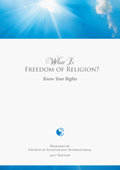The United Nations, the Organization on Security and Cooperation in Europe (OSCE), the European Court of Human Rights and related regional bodies have long recognized the importance of legal personality and entity structure for religious organizations as part of their right to freedom of religion or belief.
When the right to freedom of religion or belief is discussed, one is more likely to think of the right of individuals to believe and to manifest their beliefs through worship, teaching, observance and practice. But, on reflection, individuals cannot fully exercise their right to religious freedom unless they are permitted to form legal structures to organize and operate their religious communities.
Laws governing the creation, operation, registration and recognition of religious communities are the lifeblood of religious communities. Without some form of legal-entity status, a religious community cannot engage in the most elementary acts such as owning or renting a place of worship, operating a bank account, hiring staff, contracting for services, publishing and disseminating religious texts, and establishing educational and community-outreach charitable services.
Laws governing access to legal personality should be structured in ways that facilitate freedom of religion or belief. At a minimum, access to the basic rights associated with legal personality should be available without difficulty. [28] States should ensure that legal personality and religious registration procedures are quick, transparent, fair, inclusive and non-discriminatory. [29]
Denial of access to such status represents a grave and impermissible burden on the right to freedom of religion. [30] That is why laws governing incorporation and registration of religious organizations represent an important yardstick for assessing the shape of religious freedom in a given State.
In many instances, such laws have been used as a weapon by the State to restrict religious communities rather than facilitate religious freedom. Laws that mandate religious registration and impose criminal sanctions for non-registered religious activity are draconian methods used by States to repress religious freedom in violation of human rights.
Such methods have been uniformly condemned by the UN Human Rights Committee, [31] the UN Rapporteur for Religious Freedom, [32] the OSCE Panel of Religious Experts in consultation with the Venice Commission, [33] the European Union [34] and the European Court of Human Rights. [35]
The European Court of Human Rights has determined that a refusal by a State to grant legal-entity status to an association of individuals, religious or otherwise, amounts to an interference with the exercise of the right to freedom of association. Where the organization of a religious community is at issue, a refusal to recognize it as a legal entity has also been found to constitute an interference with the right to freedom of religion as exercised by both the community itself and its individual members. [36]
The OSCE Panel of Religious Experts and the Venice Commission have identified additional problem areas in the field of religious registration and formation of legal personality that must be addressed to facilitate freedom of religion or belief:
- Individuals and groups should be free to practice their religion without registration if they so desire;
- High minimum membership requirements should not be allowed with respect to obtaining legal personality;
- It is not appropriate to require lengthy existence in the State before registration is permitted;
- Other excessively burdensome constraints or time delays prior to obtaining legal personality should be questioned;
- Provisions that grant excessive governmental discretion in giving approvals should not be allowed;
- Official discretion in limiting religious freedom, whether as a result of vague provisions or otherwise, should be carefully limited;
- Intervention in internal religious affairs by engaging in substantive-review of ecclesiastical-structures, imposing bureaucratic review or restraints with respect to religious appointments, and the like, should not be allowed;
- Provisions that operate retroactively or that fail to protect vested interests (for example, by requiring reregistration of religious entities under new criteria) should be questioned;
- Adequate transition rules should be provided when new rules are introduced; and
- Consistent with principles of autonomy, the State should not decide that any particular religious group should be subordinate to another religious group or that religions should be structured on a hierarchical pattern. (A registered religious entity should not have veto power over the registration of any other religious entity.) [37]
[28] Guidelines for Review of Legislation Pertaining to Religion or Belief, Prepared by the OSCE/ODIHR Panel of Experts on Freedom of Religion in Consultation with the Venice Commission at 16.
[29] Report of the UN Special Rapporteur on Freedom of Religion or Belief, ¶ 25, HRC 19/60, 22 December 2011.
[30] Freedom of Religion or Belief: Laws Affecting the Structuring of Religious Communities, OSCE Review Conference, September 1999.
[31] Human Rights Committee List of Issues, Kazakhstan, CCPR/C/Kaz/Q/1, 2 September 2010.
[32] Report of the UN Special Rapporteur on Freedom of Religion or Belief, ¶ 25, HRC 19/60, 22 December 2011.
[33] See, e.g., OSCE and Venice Commission Guidelines at 16.
[34] EU Guidelines at ¶ 40-41.
[35] See, e.g., Metropolitan Church of Bessarabia v. Moldova, (App. 45701/99), 2001; Church of Scientology of Moscow v. Russia (App. 18147/02), 2007.
[36] Jehovah’s Witnesses of Moscow v. Russia ¶ 101-102 (App. 302/02), 10 June 2010.
[37] See OSCE and Venice Commission Guidelines at 16-17.




























